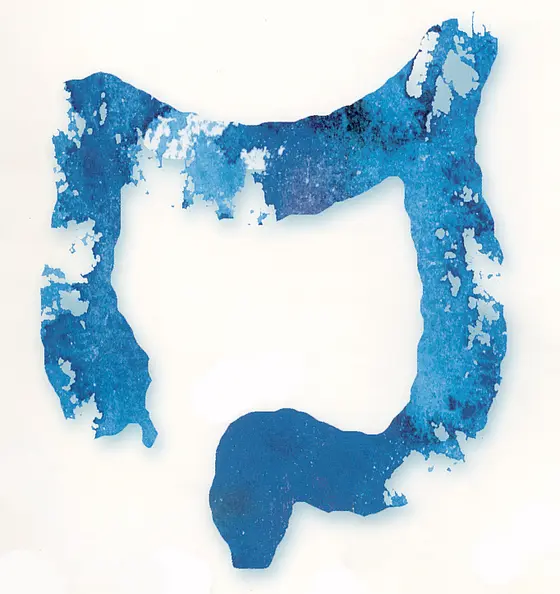For early detection of colorectal (colon) cancer, statutory health insurance in Germany offers a fecal occult blood test free of charge to all insured persons starting at 50 years of age. In addition, those 55 or older are entitled to an endoscopic examination of the colon (colonoscopy). Colonoscopy identifies precancerous lesions with a high level of exactitude. Nevertheless, only about 20-30 percent of those eligible actually take advantage of the screening examination. “Therefore, fecal occult blood tests are important, because they help us reach more people. People are much more willing to have a simple laboratory test. Hence it is all the more important for these tests to provide valuable results," says Professor Hermann Brenner from the German Cancer Research Center (Deutsches Krebsforschungszentrum, DKFZ).
The test covered by health insurance is based on the detection of enzymatic activity in fecal occult blood (a “stool guaiac test"). For several years now, immunological testing methods using antibodies to detect hemoglobin in stool samples have also been available. These tests are regarded as more sensitive; i.e., they are believed to detect more tissue abnormalities. Until now, however, the two methods have only been compared in a few small-scale studies.
Hermann Brenner and his coworker Sha Tao have now directly compared the two methods in a large-scale study for the first time. 2,235 participants who underwent colon cancer screening colonoscopies between 2005 and 2009 provided stool samples immediately prior to the examination. These were tested for occult blood using both methods. Subsequently, the DKFZ researchers analyzed the test results by comparing them with the results from colonoscopies.
The enzyme-based test detected one third of all colon cancer cases, about nine percent of advanced precancerous lesions (adenomas), and about five percent of early precancerous lesions. The specificity was slightly over 95 percent: In 95 out of 100 participants with negative test results, no tissue abnormalities were found in the subsequent colonoscopy.
However, the three immunological tests* that were used detected about twice as many cancer cases (60.0, 53.3 and 73.3 percent) and about three times as many advanced precancerous lesions, with a specificity that was a little higher than enzymatic testing.
Only one third (31 percent) of all positive results from enzymatic testing were in fact the result of a tissue abnormality. By contrast, colonoscopy confirmed the presence of an abnormality in about two thirds (57 to 68 percent) of positive results obtained by immunological testing. “Immunological tests can thus help encourage people with a positive finding to undertake a colonoscopy afterwards, meaning that those individuals who actually have precancerous lesions would likely participate in colonoscopy screening," explains Brenner.
The enzymatic test only provides a positive or negative result, whereas the immunological test quantifies hemoglobin levels. The researchers therefore had to make the results comparable by defining threshold values for the immunological tests such that both methods delivered the same number of positive results.
“For the first time we have shown by direct comparison that the diagnostic performance of immunological stool tests is significantly higher than that of the enzymatic test at the same rate of positive results," says Hermann Brenner. He hopes that his research will provide a convincing argument to health-care policy makers. “Tests for occult blood in the stool will continue to be an important part of colon cancer screening. We therefore recommend including immunological tests in cancer screening programs in Germany. Many more people would thus benefit by obtaining a life-saving clue pointing to a hidden case of cancer."
In a number of European countries that offer cancer screening programs, immunological tests have already become the standard. Besides higher sensitivity, they offer further practical advantages: They can be more easily automated, and participants do not have to avoid certain types of food prior to the test, because the antibodies react specifically to human hemoglobin. Brenner is convinced that the slightly higher costs of immunological testing will fall once the tests can be produced on a large scale.
Hermann Brenner and Sha Tao: Superior diagnostic performance of fecal immunochemical tests for hemoglobin in a head-to-head comparison with guaiac based fecal occult blood test among 2235 participants of screening colonoscopy. European Journal of Cancer 2013, http://dx.doi.org/10.1016/j.ejca.2013.04.023
* Tests studied:
Enzymatic test:
HemOccult, Beckman Coulter, Krefeld, Germany
Immunological tests:
RIDASCREEN® Haemoglobin, Biopharm, Darmstadt, Germany
RIDASCREEN® Haemo-/Haptoglobin-Complex, Biopharm, Darmstadt, Germany
OC Sensor, Eiken Chemicals, Tokyo, Japan
About DKFZ
With more than 3,000 employees, the German Cancer Research Center (Deutsches Krebsforschungszentrum, DKFZ) is Germany’s largest biomedical research institute. DKFZ scientists identify cancer risk factors, investigate how cancer progresses and develop new cancer prevention strategies. They are also developing new methods to diagnose tumors more precisely and treat cancer patients more successfully. The DKFZ's Cancer Information Service (KID) provides patients, interested citizens and experts with individual answers to questions relating to cancer.
To transfer promising approaches from cancer research to the clinic and thus improve the prognosis of cancer patients, the DKFZ cooperates with excellent research institutions and university hospitals throughout Germany:
- National Center for Tumor Diseases (NCT, 6 sites)
- German Cancer Consortium (DKTK, 8 sites)
- Hopp Children's Cancer Center (KiTZ) Heidelberg
- Helmholtz Institute for Translational Oncology (HI-TRON Mainz) - A Helmholtz Institute of the DKFZ
- DKFZ-Hector Cancer Institute at the University Medical Center Mannheim
- National Cancer Prevention Center (jointly with German Cancer Aid)
The DKFZ is 90 percent financed by the Federal Ministry of Research, Technology and Space and 10 percent by the state of Baden-Württemberg. The DKFZ is a member of the Helmholtz Association of German Research Centers.



